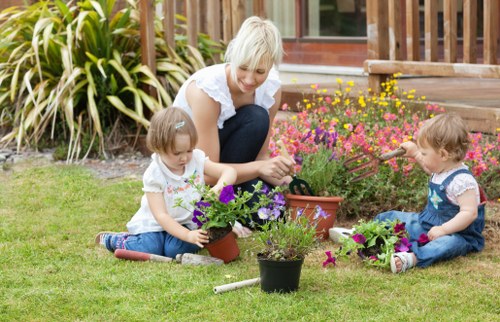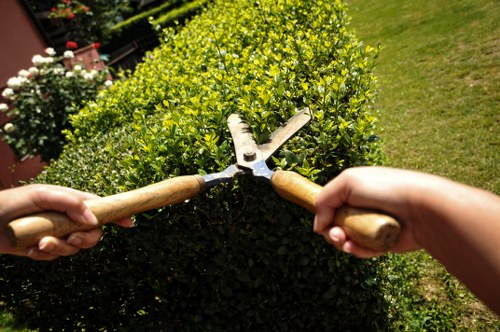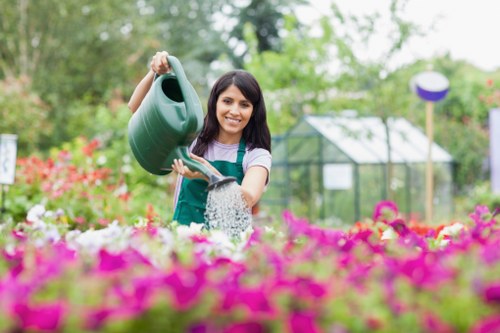Comprehensive Guide to Garden Maintenance in Edmonton
Introduction to Garden Maintenance

Maintaining a beautiful garden in Edmonton requires a blend of knowledge, effort, and the right techniques tailored to the local climate. Whether you're a seasoned gardener or a novice, understanding the nuances of garden care in this region can make a significant difference in the health and appearance of your plants.
Edmonton's unique climate, characterized by cold winters and warm summers, poses specific challenges for garden maintenance. Proper planning and regular upkeep are essential to ensure that your garden thrives throughout the year. This guide provides actionable tips and insights to help you achieve a vibrant and resilient garden in Edmonton.
From soil preparation to seasonal planting schedules, we'll cover all aspects of garden maintenance. By following these guidelines, you'll be able to create a lush and inviting outdoor space that enhances the beauty of your home.
Understanding Edmonton’s Climate

Edmonton experiences a continental climate, which brings cold winters with temperatures often plummeting below freezing, and warm, sometimes hot, summers. This climate influences the types of plants that can thrive in local gardens and affects maintenance practices.
The long daylight hours in summer provide ample time for plants to photosynthesize, promoting growth. However, the short days in winter require gardeners to prepare for dormant periods. Understanding these seasonal changes is crucial for effective garden maintenance.
Additionally, Edmonton's soil can vary, often requiring amendments to support plant health. Testing your soil and making necessary adjustments can lead to better plant growth and a more resilient garden.
Soil Preparation and Improvement

Healthy soil is the foundation of any successful garden. In Edmonton, where soils can be heavy and clayey, improving soil structure is essential. Start by testing your soil's pH and nutrient levels to determine what amendments are needed.
Incorporating organic matter such as compost or well-rotted manure can enhance soil fertility and drainage. Mulching also helps retain moisture, suppress weeds, and regulate soil temperature, which is particularly beneficial during Edmonton's extreme seasonal changes.
Regularly aerating your soil, especially if it's compacted, allows roots to breathe and access essential nutrients. This practice promotes stronger plant growth and reduces the risk of root diseases.
Plant Selection and Seasonal Planting

Choosing the right plants is critical for garden success in Edmonton. Opt for species that are hardy and well-suited to the local climate. Perennials that can withstand cold winters and annuals that bloom in the summer months can provide continuous color and interest in your garden.
Seasonal planting is another important aspect. Plant bulbs in the fall to ensure spring blooms, and select summer flowers that can handle the heat. Additionally, incorporating native plants can reduce maintenance efforts as they are naturally adapted to the local environment.
Consider the growing season when planning your garden layout. Positioning plants according to their sunlight and shade requirements can optimize their growth and health.
Watering Practices in Edmonton

Effective watering is a cornerstone of garden maintenance. In Edmonton, summers can be dry, making regular watering essential. However, overwatering can lead to root rot and other issues. It's important to establish a watering schedule that meets the needs of your specific plants.
Drip irrigation systems are an efficient way to deliver water directly to plant roots, minimizing waste and ensuring consistent moisture levels. Additionally, watering in the early morning reduces evaporation and allows plants to absorb moisture before the heat of the day.
During the winter months, watering needs decrease, but it's still important to monitor soil moisture to prevent plants from drying out completely. Adjust your watering practices based on seasonal changes and weather patterns.
Pruning and Deadheading

Regular pruning helps maintain the shape and health of your plants. In Edmonton, pruning should be done during the appropriate seasons to avoid damaging plants. Early spring is ideal for most shrubs and trees, while deadheading annuals can encourage continuous blooming throughout the summer.
Removing dead or diseased branches reduces the risk of pests and diseases spreading to healthy parts of the plant. It also improves air circulation, which is beneficial in preventing fungal issues.
Proper pruning techniques involve using clean, sharp tools and making precise cuts to promote healing and growth. Educate yourself on the specific pruning needs of each plant species in your garden.
Pest and Disease Management

Managing pests and diseases is a vital part of garden maintenance. In Edmonton, the diverse climate can lead to a variety of pest issues, from aphids to deer. Implementing integrated pest management (IPM) strategies can help control pests organically and sustainably.
Regularly inspecting your plants for signs of pests or diseases allows for early intervention. Natural predators, such as ladybugs and spiders, can help keep pest populations in check. Additionally, using organic treatments like neem oil or insecticidal soaps can be effective without harming beneficial insects.
Maintaining plant health through proper watering, pruning, and soil management reduces the likelihood of pest infestations and disease outbreaks. Healthy plants are more resilient and better equipped to fend off unwanted intruders.
Mulching and Weed Control

Mulching plays a significant role in garden maintenance by conserving moisture, suppressing weeds, and enriching the soil. In Edmonton, applying a layer of mulch around your plants can protect roots from temperature extremes and reduce the need for frequent watering.
Organic mulches, such as bark, straw, or compost, break down over time, adding nutrients to the soil. They also improve soil structure and fertility, benefiting plant growth. In contrast, inorganic mulches like gravel or rubber are longer-lasting but do not contribute to soil health.
Effective weed control involves regular weeding and the strategic use of mulch to prevent weed seeds from germinating. Keeping your garden free of weeds not only improves its appearance but also reduces competition for resources among your plants.
Fertilizing for Optimal Growth

Fertilizing your garden ensures that plants receive the necessary nutrients for robust growth. In Edmonton, selecting the right fertilizer depends on your soil's specific needs, which can be determined through soil testing.
Organic fertilizers, such as compost or fish emulsion, provide a slow release of nutrients, improving soil health over time. Synthetic fertilizers offer a more immediate nutrient boost but should be used cautiously to avoid over-fertilization.
Applying fertilizer during the growing season supports active plant growth. Follow recommended application rates and schedules to maintain a balanced nutrient supply and prevent potential harm to plants.
Seasonal Garden Maintenance Tasks

Garden maintenance in Edmonton varies throughout the year, with specific tasks suited to each season.
- Spring: Clean up garden beds, start planting early vegetables, prune shrubs, and apply mulch.
- Summer: Regular watering, deadheading flowers, managing pests, and harvesting crops.
- Fall: Plant bulbs for spring, rake leaves, divide perennials, and protect plants from frost.
- Winter: Plan garden layouts, maintain tools, and provide winter protection for sensitive plants.
Adhering to a seasonal maintenance schedule helps in anticipating and addressing garden needs proactively, ensuring continuous plant health and garden beauty.
Tools and Equipment for Garden Maintenance

Having the right tools makes garden maintenance more efficient and effective. Essential tools for Edmonton gardeners include:
- Pruning shears for trimming plants and shrubs.
- Garden gloves to protect your hands during tasks.
- Spades and shovels for digging and soil preparation.
- Watering systems like hoses and drip irrigation kits.
- Wheelbarrows for transporting soil, compost, and plants.
Investing in high-quality tools ensures durability and ease of use, allowing you to perform maintenance tasks with greater precision and less effort.
Creating a Sustainable Garden

Embracing sustainable practices in your garden reduces environmental impact and promotes long-term health. Consider the following strategies for a more eco-friendly garden in Edmonton:
- Composting: Recycle kitchen scraps and yard waste to create nutrient-rich compost for your garden.
- Rainwater Harvesting: Collect rainwater to use for irrigation, reducing reliance on municipal water sources.
- Native Plants: Incorporate native species that require less water and are more resistant to local pests.
- Organic Practices: Use organic fertilizers and pest control methods to maintain soil and plant health naturally.
Implementing these practices not only benefits the environment but also enhances the resilience and productivity of your garden.
Landscape Design Tips

A well-designed landscape complements your garden maintenance efforts. Effective landscape design in Edmonton considers factors such as plant selection, layout, and functionality.
Balance is key when designing your garden. Incorporate a mix of textures, colors, and plant heights to create visual interest. Pathways and garden beds should be thoughtfully arranged to facilitate easy access for maintenance tasks.
Consider incorporating elements like pergolas, garden benches, or water features to enhance the aesthetic appeal and usability of your outdoor space.
Winterizing Your Garden

Preparing your garden for the harsh Edmonton winter is essential to protect plants and ensure a smooth transition to the next growing season. Start by clearing debris and leaving beds free of dead plants and weeds.
Mulch can be applied to insulate plant roots and prevent soil from freezing. For sensitive plants, consider adding protective coverings like burlap or frost blankets to shield them from extreme cold.
It's also a good time to prune trees and shrubs, focusing on removing any damaged or diseased branches. Proper winterization sets the stage for a healthy and vibrant garden once spring arrives.
Hiring Professional Garden Maintenance Services

While many garden tasks can be handled by homeowners, certain aspects of maintenance may benefit from professional expertise. Hiring a local garden maintenance service in Edmonton ensures that your garden receives specialized care tailored to the region's specific needs.
Professional gardeners have the experience and knowledge to handle complex tasks such as landscape design, pest management, and soil remediation. They can also provide ongoing maintenance services, freeing up your time to enjoy your outdoor space.
Investing in professional garden maintenance not only enhances the beauty and health of your garden but also increases the overall value of your property.
DIY Garden Maintenance Tips

For those who prefer a hands-on approach, DIY garden maintenance can be both rewarding and cost-effective. Here are some practical tips to keep your Edmonton garden in top shape:
- Regular Weeding: Stay on top of weeds to prevent them from overtaking your garden beds.
- Pruning: Regularly trim plants to encourage healthy growth and remove any dead or damaged parts.
- Soil Care: Amend your soil with compost and organic matter to maintain fertility and structure.
- Plant Rotation: Rotate crops annually to reduce soil depletion and minimize pest buildup.
- Mulching: Apply mulch to conserve moisture and suppress weed growth.
By incorporating these DIY practices, you can maintain a thriving garden with minimal reliance on external services.
Maximizing Garden Space

Maximizing the available space in your Edmonton garden can lead to a more productive and visually appealing landscape. Consider the following strategies to optimize your garden space:
- Vertical Gardening: Utilize trellises, pergolas, and vertical planters to grow climbing plants and save ground space.
- Raised Beds: Elevated garden beds can improve drainage, reduce soil compaction, and make gardening more accessible.
- Companion Planting: Plant compatible species together to enhance growth and deter pests naturally.
- Efficient Layout: Plan the placement of plants based on their sunlight, water, and spacing requirements to ensure optimal growth.
Effective space management allows you to cultivate a diverse and lush garden, even in smaller areas.
Edmonton Garden Maintenance Challenges

Garden maintenance in Edmonton comes with its own set of challenges, including extreme temperature fluctuations, soil conditions, and seasonal changes.
Cold winters can damage sensitive plants, while hot summers may stress others. Adapting your maintenance practices to address these challenges is essential for year-round garden health.
Additionally, local pests and diseases may require specific control measures. Staying informed about common issues in the Edmonton area and implementing preventive strategies can help mitigate these challenges effectively.
Benefits of Regular Garden Maintenance

Consistent garden maintenance offers numerous benefits beyond aesthetic appeal. A well-maintained garden promotes healthier plants, reduces the risk of diseases, and enhances outdoor living spaces.
Proper maintenance practices lead to increased biodiversity, providing habitats for beneficial insects and wildlife. A thriving garden can also improve mental well-being, offering a peaceful retreat and opportunities for relaxation and recreation.
Moreover, regular upkeep can boost property value, making your home more attractive to potential buyers and enhancing curb appeal.
Innovative Garden Maintenance Techniques

Embracing innovative techniques in garden maintenance can lead to more efficient and sustainable practices. Consider the following modern approaches:
- Smart Irrigation: Use weather-based irrigation controllers and soil moisture sensors to optimize watering schedules.
- Green Technology: Implement solar-powered garden lights and eco-friendly tools to reduce your environmental footprint.
- Hydroponics: Explore soil-less gardening methods for certain plants, which can save space and resources.
- Composting Systems: Adopt advanced composting techniques like vermiculture to produce high-quality compost efficiently.
Incorporating these innovative methods can enhance the sustainability and productivity of your garden, making maintenance more manageable and eco-friendly.
Conclusion

Maintaining a garden in Edmonton requires a thoughtful approach that considers the local climate, soil conditions, and seasonal changes. By implementing effective soil preparation, plant selection, watering practices, and sustainable maintenance techniques, you can ensure a thriving and beautiful garden throughout the year.
Whether you choose to handle maintenance yourself or hire professional services, the key is consistency and attention to detail. A well-maintained garden not only enhances the beauty of your home but also provides a tranquil and rewarding outdoor space.
Ready to transform your garden? Contact us today to learn more about our garden maintenance services in Edmonton and take the first step towards a stunning and healthy garden.